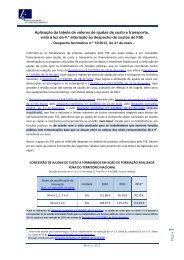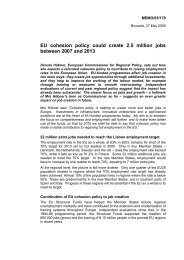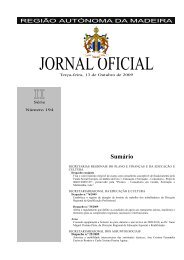Industrial Relations in Europe 2012 - European Commission - Europa
Industrial Relations in Europe 2012 - European Commission - Europa
Industrial Relations in Europe 2012 - European Commission - Europa
You also want an ePaper? Increase the reach of your titles
YUMPU automatically turns print PDFs into web optimized ePapers that Google loves.
government will facilitate the accord; if not, further consultations will be held. An agreement on<br />
pension reform was reached <strong>in</strong> June 2011 between the government and the social partners.<br />
In addition, trade unions play an important role <strong>in</strong> represent<strong>in</strong>g pensioners <strong>in</strong> some countries. In<br />
Italy, for example, pensioners’ trade unions represent a significant proportion of Italian trade<br />
unions, account<strong>in</strong>g for around half of their membership and tak<strong>in</strong>g on a significant role <strong>in</strong> social<br />
policy and collective barga<strong>in</strong><strong>in</strong>g on welfare issues more widely (Peders<strong>in</strong>i 2000). Given the age<strong>in</strong>g<br />
of <strong>Europe</strong>’s population, this is likely to cont<strong>in</strong>ue over the com<strong>in</strong>g decades.<br />
6.5.2 Second and third pillar pension provision<br />
One key aspect of pension provision, and the ma<strong>in</strong> area of development <strong>in</strong> terms of pension policy,<br />
has been the growth <strong>in</strong> recent years <strong>in</strong> second pillar (occupational) and third pillar (private and<br />
supplementary) pension schemes, mostly as a supplement to dw<strong>in</strong>dl<strong>in</strong>g state provision. In many<br />
countries, the growth of these additional pillars has <strong>in</strong>creased social partner <strong>in</strong>volvement <strong>in</strong> the<br />
formulation and implementation of pension provision. Involvement of the social partners <strong>in</strong> these<br />
additional pillars is important <strong>in</strong> terms of long-term susta<strong>in</strong>able and secure policy formulation, as<br />
these additional schemes are <strong>in</strong>tended to plug the gap left by the reduction of state pension<br />
provision.<br />
In some national systems, such as those <strong>in</strong> Sweden and France, the social partners have a long<br />
tradition of <strong>in</strong>volvement <strong>in</strong> second pillar pension provision, and so their <strong>in</strong>volvement is well<br />
established. In Sweden, occupational pension schemes date back to the 1970s and the social<br />
partners were <strong>in</strong>volved <strong>in</strong> the late 1990s <strong>in</strong> negotiat<strong>in</strong>g changes to the fund<strong>in</strong>g of occupational<br />
pension schemes, alongside reforms <strong>in</strong> the state pension scheme (Ebb<strong>in</strong>ghaus 2002). In France also,<br />
the social partners jo<strong>in</strong>tly run the two national supplementary pension schemes - Agirc for<br />
managerial/professional staff and Arrco for other employees.<br />
The social partners also play a role <strong>in</strong> sav<strong>in</strong>gs schemes that contribute to pension funds <strong>in</strong> France<br />
and Italy (Natali 2009). In France, these are company-level schemes such as employee sav<strong>in</strong>gs<br />
plans and profit-shar<strong>in</strong>g schemes, while <strong>in</strong> Italy, the social partners play an important role <strong>in</strong><br />
manag<strong>in</strong>g the shift<strong>in</strong>g of resources from severance pay schemes (the end of service allowance -<br />
trattamento di f<strong>in</strong>e rapporto, Tfr) <strong>in</strong>to pension funds. However, problems can arise, due to a lack of<br />
expertise and knowledge if, for example, board members are appo<strong>in</strong>ted on the basis of their trade<br />
union status rather than on the basis of their pension knowledge and expertise. This issue is also<br />
relevant to recent debate <strong>in</strong> the Netherlands, where the M<strong>in</strong>ister of Social Affairs stated that<br />
management of pension funds should be carried out by relevant experts rather than the social<br />
partners (Grünell 2011).<br />
Social partner <strong>in</strong>volvement <strong>in</strong> the negotiation and runn<strong>in</strong>g of second-pillar occupational pension<br />
schemes demonstrates the <strong>in</strong>tersection of <strong>in</strong>dustrial relations and social security policy, as<br />
occupational pensions take the form of deferred wages for employees <strong>in</strong> a given sector. However,<br />
the presence of well-developed social partners is a prerequisite for this to be successful: <strong>in</strong> order to<br />
be able to engage mean<strong>in</strong>gfully <strong>in</strong> discussions on the development of occupational pensions, unions<br />
and employers need to have a certa<strong>in</strong> level of strength and support. Further, the strength of<br />
collective barga<strong>in</strong><strong>in</strong>g mach<strong>in</strong>ery and <strong>in</strong>stitutions is also vital to the coverage, f<strong>in</strong>anc<strong>in</strong>g and benefits<br />
of these schemes. Negotiated and funded occupational pension schemes are arguably the next best<br />
243

















